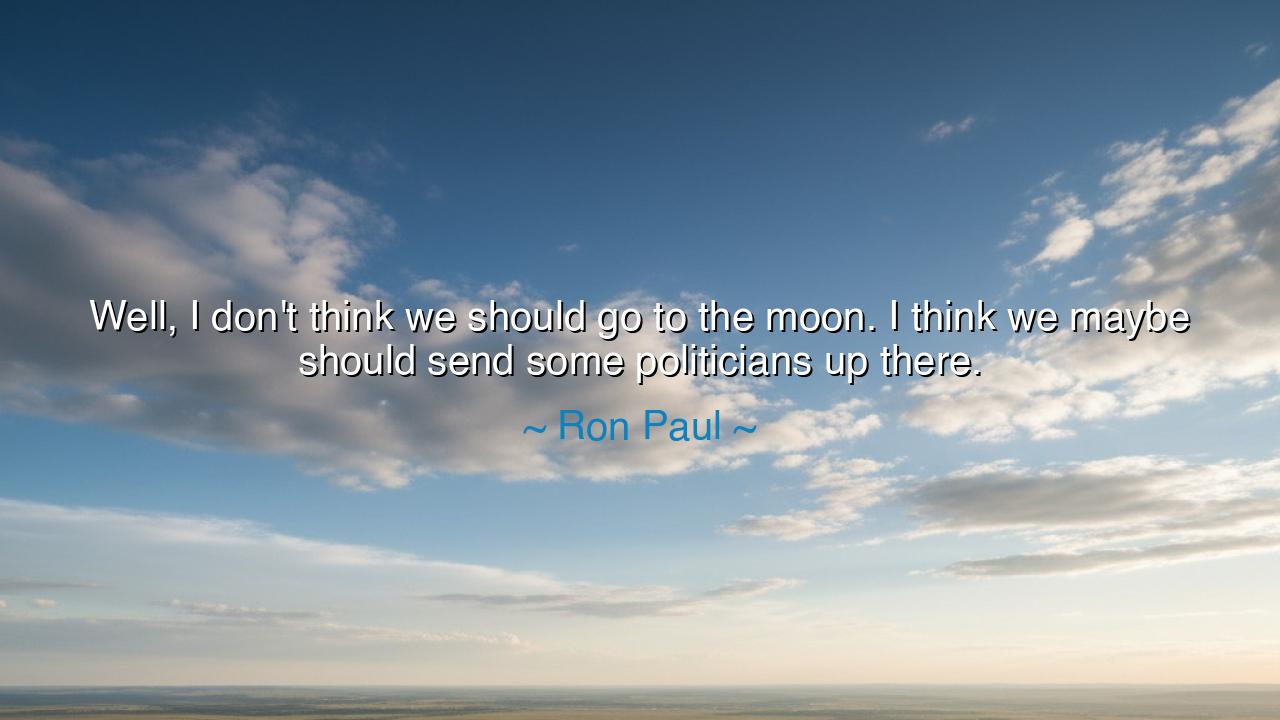
Well, I don't think we should go to the moon. I think we maybe
Well, I don't think we should go to the moon. I think we maybe should send some politicians up there.






In the great theater of human endeavor, where the heavens themselves are sought and the stars within our grasp are reached, there lies a timeless question that echoes through the ages: What is the purpose of our pursuits? Ron Paul, with words both sharp and satirical, once remarked, "Well, I don't think we should go to the moon. I think we maybe should send some politicians up there." At first, these words might strike the ear as humor, a jest made to lighten the burdens of the world. But in truth, they carry a profound and biting wisdom, one that calls upon us to reflect upon the nature of ambition, leadership, and the way in which human energies are directed.
For we, as a people, have often gazed upward, dreaming of the Moon as a new frontier, a land of promise and discovery. We send our finest men and women into the vastness of space, entrusting them with the dreams of all mankind. Yet, Ron Paul’s words remind us that in all our ambition, in all our striving for the stars, we sometimes fail to focus on the realities here on Earth. The Moon may be a symbol of human progress, but it is also a reflection of our priorities. It asks of us: Are we truly addressing the needs of the people? Or are we lost in the pursuit of glory, while the foundations of our civilization grow ever weaker?
The history of great civilizations is not solely the history of their conquests of distant lands, nor their triumphs in the heavens. It is, at its core, the history of their leaders—how they guided the people, how they stewarded the resources and destinies of those under their care. Let us turn our gaze to the ancient Romans, who, though they built great roads and conquered vast empires, fell to the weaknesses of their own leadership. The senators of Rome were often far removed from the struggles of the common man. Their focus was not on the well-being of the people but on the expansion of power, and so their empire crumbled. Ron Paul's quote serves as a sharp reminder: those who lead must first understand the needs of the people, and only when these are fulfilled can they look to the stars.
It is said that when Apollo 11 landed upon the Moon, it was a moment of tremendous triumph for humanity. Yet even as men planted their feet upon the lunar soil, back on Earth, many were grappling with poverty, inequality, and unrest. How often do we, like the Romans, turn our gaze to distant goals, while the fires of struggle burn closer to home? Paul’s words, though tinged with irony, point to a critical truth: we must not allow ourselves to become so enamored with grand ambitions that we neglect the people we are meant to serve. Leadership, true leadership, is grounded in humility, in understanding the needs of the present, not in chasing the fleeting glories of the future.
Consider the leaders of the civil rights movement, whose efforts were not for glory or for the headlines, but for the simple truth that all men and women are deserving of equal rights. They did not look to the stars for their inspiration but to the hearts of the people. Leaders like Martin Luther King Jr. knew that the struggles of their time were just as important as any journey to the Moon. Their vision was one of unity, compassion, and progress, grounded in the earth they walked upon, rather than in the heavens they might one day touch. Ron Paul's words echo the call for such leadership—one that does not seek to escape the world’s problems by reaching for the stars, but one that faces them with wisdom, empathy, and resolve.
In these modern times, we too must look at our world and ask ourselves: Where should our energies be directed? Are we building monuments in the heavens while our foundations here on Earth crack beneath our feet? Ron Paul’s suggestion to send politicians to the Moon, though light-hearted, reminds us that sometimes the greatest contribution we can make is not in grand displays of power or wealth but in the simple act of listening to those we serve. Leadership is not about elevation; it is about connection. It is not about reaching the Moon, but about ensuring that the Earth beneath us is strong enough to support us.
Therefore, O children of the future, heed this lesson well: True leadership lies not in escapism, but in the ability to meet the challenges of the present with wisdom, compassion, and foresight. Seek not the distant stars while neglecting the hearts of your people. Let the ground you walk upon be firm, for only then can you lift your gaze to the heavens with clarity and purpose. Let Ron Paul’s words guide you, not as a jest, but as a call to action: if we must send anyone into space, let it be those who understand the needs of the Earth, those who will lead not with ambition for themselves, but with purpose for all.






AAdministratorAdministrator
Welcome, honored guests. Please leave a comment, we will respond soon